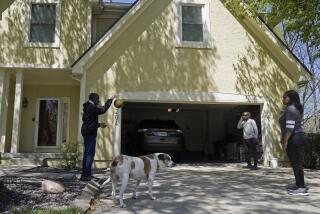A teen mom hopes to overcome her violent past
- Share via
Reporting from Chicago — Shantell Thomas stood in front of her son’s strawberry birthday cake, jaw clenched, knuckles white from the ferocious grip she had on the 10-inch carving knife.
A dozen rowdy youngsters behind her pushed toward the cake, jostling Thomas and knocking foam cups off the table. Jabari, the 1-year-old birthday boy, sat on his aunt’s lap nearby and wailed.
Thomas wheeled around and raised the knife. “Back the F up!” she yelled, catching herself before a curse could slip out. “Or I’m about to cut some necks off.”
It had been a stressful night for the 18-year-old mother of two, who organized a party for a dozen and then saw 40 show up. Her mom didn’t make it, and she was left to run Pin the Tail on the Donkey by herself.
Her outburst was the default reaction of a teenager raised in a home where violence was the accepted way of dealing with frustration. And her struggle represents the challenge of teaching a youngster how to manage the stress of motherhood and break the intergenerational cycle of violence.
Thomas is working to alter her aggressive tendencies, and help at the party came in the form of Cynthia Brown, her counselor in a parenting program.
“Shantell,” Brown said, “maybe we can think about a better way to say that?”
Thomas dropped the knife to hip level and relaxed her shoulders. “OK, OK, back up, everyone,” she said, her voice still tense. “Back up!”
Research shows that children raised in violent homes are more likely to be violent themselves. But a growing body of science suggests there are crucial stages when intervention can interrupt the cycle. And new findings in brain development, human behavior and economics suggest that early childhood is the most important and cost-effective time.
If Jabari is to learn alternatives to aggressive behavior, it must be imprinted onto his brain now. Doing that starts with his mother.
“Children model what they see. If they see the parents using physical aggression, then the child will learn that when they meet life’s frustrations, the right thing to do is use physical aggression,” said Seth Scholer, a professor of pediatrics at Vanderbilt University in Nashville who has studied violence and parenting programs. “Evidence points to the fact that ineffective parenting and early childhood aggression are two of the root causes of violence.”
Thomas is aware of the research, and she wants to change: She enrolled in Parents Too Soon, a program that sends educators into homes to teach young mothers about the social, emotional and brain development of children.
But her desire for improvement often crashes into her life’s history.
Thomas grew up in a home steeped in violence and drug dealing. She got pregnant when she was 11 -- the father of the baby was sent to prison for sexual assault of a minor. Thomas’ 6-year-old daughter is living temporarily with Thomas’ mother.
Jabari’s father is in jail, accused of shooting a 15-year-old girl.
Thomas says she has dealt drugs and settled disagreements with her fists. She walks her treacherous Chicago neighborhood with shoulders back, chest forward, suggesting she is not to be messed with. “I’m always feeling like I’ve got to get my licks in,” she said.
But behind the adult-like armor is a child’s softness.
During the teen parenting group sessions, Thomas is the one who soothes the crying babies. She’s the one who volunteers every month at the local food drive. And she’s the one who spent most of the day cooking, decorating and choosing favors for her son’s party.
Home visiting programs have been part of the U.S. social fabric since the 19th century, when public health nurses and social workers provided healthcare and parenting education to women in urban areas.
In the last 20 years, a raft of research has shown that these programs can improve parenting skills, boost children’s cognitive and emotional development, keep mothers on track academically and lower the risk of child abuse and neglect, said Neil Guterman, a professor at the University of Chicago and an expert on home visiting. “There’s strong evidence to show these programs, if implemented properly, can improve the life course of the mother and the child,” he said.
Thomas joined Parents Too Soon as a 17-year-old high school dropout with both parents in prison for drug dealing. She worried she would never overcome the family history of poverty, crime and bad parenting.
“My father taught me to be a hustler. My mama taught me how to talk people out of stuff I want,” she said. “I want to be a better parent than what my parents did. I needed someone to teach me how to do better than that.”
More to Read
Sign up for Essential California
The most important California stories and recommendations in your inbox every morning.
You may occasionally receive promotional content from the Los Angeles Times.










